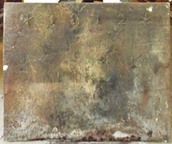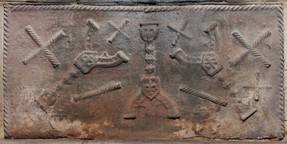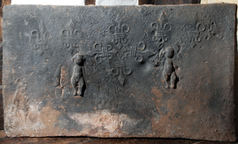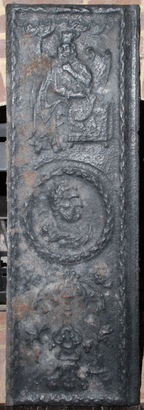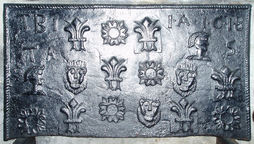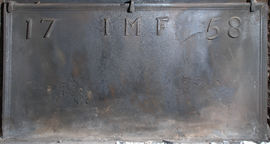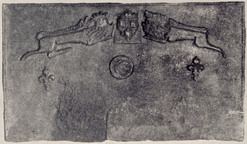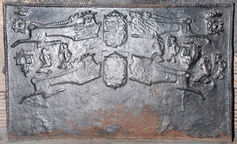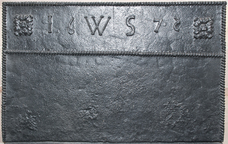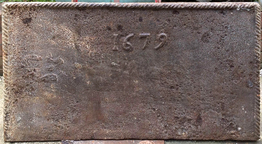-
1127
Description: Plain rectangle; no edging; top centre, date between two six-pointed stars.
Notes: Characteristic of the last firebacks cast at Ashburnham Furnace, Sussex. One of a small series of firebacks cast in the early-19th century for farms on the Ashburnham estate.
Inscription: * 1812 *
- Decoration tags:
- rectangular (shape)
- none (edging)
- carved stamps
- individual numbers
- text
- objects
Manufactured: in 1812 at Ashburnham Furnace in the Weald area of England.
Current location: not known.
- Attached to series:
- Date only firebacks
- Ashburnham late series
-
912
Description: Rectangular; twisted rope edging (top and sides); impression of the end of a firedog repeated three times, one upright in centre, two diagonally inverted with feet angled towards top centre; a large saltire of twisted rope in each top corner, a small saltire, of twisted rope and dowel, on either side of top of central firedog; cross of twisted rope below right hand corner saltire; lower centre, two angled rope lengths either side of central firedog. At the bottom, and outside the feet of the central firedog, two excrescences formed by the pouring of the metal.
Notes: A well-preserved example with an unusual arrangement of the firedog stamp; formerly (c.1886) in the Warbill-in-Tun inn, Warbleton, Sussex.
- Decoration tags:
- rectangular (shape)
- rope (edging)
- simple stamps
- apotropaic
- objects
Manufactured: in the mid- to late-16th century in the Weald area of England.
Current location: in private hands, Heathfield, East Sussex, England.
Citation: Balcomb, J. T., Nov. 1886, 'An Extinct Sussex Art', The Art Journal, pp. 337-340.
- Attached to series:
- Firedog stamp firebacks
- Metalware stamp firebacks
-
922
Description: Rectangular; no edging; arrangement of eight fleur de lys stamps formed of, at top centre, four in a cross shape, with two in line on each side; on each side of the cross arrangement is a naked standing putto stamp.
Notes: The putti are an unusual addition to what is a quite crudely decorated fireback
- Decoration tags:
- rectangular (shape)
- none (edging)
- carved stamps
- heraldic
- humans
Manufactured: in the late-16th century in the Weald area of England.
Current location: in private hands, Heathfield, East Sussex, England.
- Attached to series:
- Figurine firebacks
-
923
Description: Rectangular; overlapping laurel leaf edging with flange on right edge; top, seated figure of a monarch with a casket at his left side and the back of a throne behind; centre, bust of a classical male figure facing to the right, surrounded by a circlet of overlapping laurel leaves; bottom, ornamental pedestal on a legged stand, floral fronds issuing from the top, between two flower heads, and descending symmetrically to the bottom.
Notes: Not a fireback, but a left side fireplace back plate. It had a circular aperture in the centre into which, in this instance, a medallion and bust were inserted, the same being inserted into an elaborate baroque fireback (no. 452).
- Decoration tags:
- rectangular (shape)
- overlapping laurel leaf (edging)
- carved stamps
- carved pattern panels
- biblical
- humans
- plants
Manufactured: in the early- to mid-18th century probably at Robertsbridge Furnace, Salehurst in the Weald area of England.
Current location: in private hands, Heathfield, East Sussex, England.
- Attached to series:
- Baroque series
- Fireplace back plates
-
192
Description: Rectangular; twisted rope edging (top and sides); irregular arrangement of four stamps in three rows: face mask with ?crown and ruff (3), flower head with four petals and leaflets (4), fleur de lys (5), and profile of a head with 'Roman' crest (2); initials replace stamps in top corners.
Notes: A larger variant, undated and with other initials but the same four stamps, is also known.
Inscription: TBI I•A•1•6•1•8 / TA S
- Decoration tags:
- rectangular (shape)
- rope (edging)
- carved stamps
- individual letters
- individual numbers
- heraldic
- text
- humans
- plants
Manufactured: in 1618 possibly in the Weald area of England.
Current location: Godolphin House, Helston, Cornwall, England.
Museum number: 169481 (part of the National Trust museum group)
- Attached to series:
- Primitive stamp series
-
902
Description: Rectangular with ogee moulded edging (top and sides); symmetrically spaced along the top, initials, IMF, between split date in well-defined characters.
Notes: The initials are believed to be of John Meers Fagg, who owned Blackford Farm, Herstmonceux, at that date. Fagg purchased three firebacks from Heathfield Furnace, Sussex, in September 1758, costing £4 10s. 6d. They were cast by Thomas Cavie, who was paid a shilling a piece (East Sussex Record Office, Brighton, SAS-RF/15/3/35, f.22). At least one other fireback is known with some of the same character set.
Inscription: 17 IMF 58
- Decoration tags:
- rectangular (shape)
- cyma reversa/ogee (edging)
- carved stamps
- individual letters
- individual numbers
- text
Manufactured: in 1758 at Heathfield Furnace in the Weald area of England.
Current location: in private hands, Herstmonceux, East Sussex, England.
- Attached to series:
- 1750s Heathfield series
-
1174
Description: Rectangular; twisted rope edging (top and sides); top centre, crowned shield bearing initials, KH, above a fleur-de-lys, between a leopard passant guardant sinister (on the left) and a leopard passant (on the right); below the rear legs of each leopard, a fleur-de-lys, each inclined slightly outwards at the top; beneath, and slightly to the left of the shield a circular stamp bearing the letter C.
Notes: One of the legs of the leopard on the right is missing, suggesting that the stamps, which appear complete on many firebacks, were well used and had been damaged; this suggests a relatively late use of these stamps. The style of fleur-de-lys is one of two seen on this series of firebacks. The fireback was formerly at Marden Hill House, Tewin, Hertfordshire.
Inscription: C
- Decoration tags:
- rectangular (shape)
- rope (edging)
- carved stamps
- heraldic
- royal
- text
- animals
- objects
Manufactured: in the mid- to late-16th century in the Weald area of England.
Current location: Hertford Museum, 18 Bull Plain, Hertford, Hertfordshire, England.
Museum number: HETFM2893.2 (part of the Hertford Museum museum group)
- Attached to series:
- Royal series
- Fleur-de-lys firebacks
-
322
Description: Rectangular; rope edging (top and sides); two central crowned Tudor shields, one above the other, each with lion passant guardant sinister to the left, and lion passant to right; crowned, barbed, four-petalled rose in right and left corners; two crowned shields with KH in Lombardic characters above a fleur de lys, each irregularly placed between lions on left and right sides; three 'imps' with right arm raised, two on right and one on left between lions; two ‘imps’ with both arms lowered, one on each side in similar positions.
Notes: One of the legs of the leopards on the right is missing, suggesting that the stamp, which appears complete on many firebacks, was well used and had been damaged; this suggests a relatively late use of these stamps. The same heraldic charges can be seen on other firebacks, with other charges, forming the decoration on many other firebacks, suggesting they were the stock of one particular furnace.
Arms: Tudor royal arms of England
- Decoration tags:
- rectangular (shape)
- rope (edging)
- carved stamps
- heraldic
- armorial
- royal
- animals
Manufactured: in the mid- to late-16th century in the Weald area of England.
Current location: Hever Castle, Hever, Kent, England.
- Attached to series:
- Royal series
-
1271
Description: Rectangular shape; twisted rope edging (top and sides only); central initials, WS, in different character sets, between split date, also in different numeral sets, with a rectangular floral patera repeated at each end; below, and at a slight incline to the right, a horizontal twisted rope dividing the plate. The '5' of the date has been stamped in reverse.
Notes: A boldly cast fireback with disparate character styles. Probably acquired for the castle in the early-20th century during its refurbishment for Edward Hudson by Edwin Lutyens.
Inscription: 1 6 W S 7 5 [5 reversed]
- Decoration tags:
- rectangular (shape)
- rope (edging)
- simple stamps
- carved stamps
- individual letters
- individual numbers
- text
- plants
Manufactured: in 1675 in England.
Current location: Lindisfarne Castle, Holy Island, Northumberland, England.
Museum number: 511616 (part of the National Trust museum group)
- Attached to series:
- Miscellaneous stamp firebacks
-
1232
Description: Rectangular; twisted rope edging on top and sides; date placed slightly right of centre near top.
Notes: A similar fireback with slightly different proportions has the same date using the same numerals.
Inscription: 1679
- Decoration tags:
- rectangular (shape)
- rope (edging)
- carved stamps
- individual numbers
- text
Manufactured: in 1679 in the Weald area of England.
Current location: not known.
- Attached to series:
- Date only firebacks
- 1679 Wealden series
